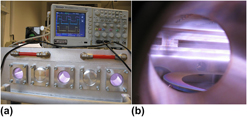Crossref Citations
This article has been cited by the following publications. This list is generated based on data provided by
Crossref.
Taylor, Andrew
Fekete, Ladislav
Hubík, Pavel
Jäger, Aleš
Janíček, Petr
Mortet, Vincent
Mistrík, Jan
and
Vacík, Jiři
2014.
Large area deposition of boron doped nano-crystalline diamond films at low temperatures using microwave plasma enhanced chemical vapour deposition with linear antenna delivery.
Diamond and Related Materials,
Vol. 47,
Issue. ,
p.
27.
Kratochvílová, I.
Škoda, R.
Škarohlíd, J.
Ashcheulov, P.
Jäger, A.
Racek, J.
Taylor, A.
and
Shao, L.
2014.
Nanosized polycrystalline diamond cladding for surface protection of zirconium nuclear fuel tubes.
Journal of Materials Processing Technology,
Vol. 214,
Issue. 11,
p.
2600.
Mehedi, H.-A.
Achard, J.
Rats, D.
Brinza, O.
Tallaire, A.
Mille, V.
Silva, F.
Provent, Ch.
and
Gicquel, A.
2014.
Low temperature and large area deposition of nanocrystalline diamond films with distributed antenna array microwave-plasma reactor.
Diamond and Related Materials,
Vol. 47,
Issue. ,
p.
58.
Mistrik, J.
Janicek, P.
Taylor, A.
Fendrych, F.
Fekete, L.
Jager, A.
and
Nesladek, M.
2014.
Spectroscopic ellipsometry characterization of nano-crystalline diamond films prepared at various substrate temperatures and pulsed plasma frequencies using microwave plasma enhanced chemical vapor deposition apparatus with linear antenna delivery.
Thin Solid Films,
Vol. 571,
Issue. ,
p.
230.
Mahoney, E. J. D.
Truscott, B. S.
Ashfold, M. N. R.
and
Mankelevich, Yu. A.
2017.
Optical Emission from C2– Anions in Microwave-Activated CH4/H2 Plasmas for Chemical Vapor Deposition of Diamond.
The Journal of Physical Chemistry A,
Vol. 121,
Issue. 14,
p.
2760.
Krzyżanowska, Halina
Paxton, William F.
Yilmaz, Mesut
Mayo, Anthony
Kozub, John
Howell, Mick
Gregory, Justin
Butler, James E.
Kang, Weng Poo
Mu, Richard
Davidson, Jimmy L.
and
Tolk, Norman H.
2018.
Low temperature diamond growth arising from ultrafast pulsed-laser pretreatment.
Carbon,
Vol. 131,
Issue. ,
p.
120.
Reshi, Bilal Ahmad
Kartha, Moses J
Misra, Anuradha
and
Varma, Raghava
2019.
Investigation of diamond deposition on the diamond, silicon and quartz substrates by microwave plasma chemical vapor deposition and Monte Carlo simulations.
Materials Research Express,
Vol. 6,
Issue. 9,
p.
096420.
Gu, Jiteng
Chen, Zhongxin
Li, Runlai
Zhao, Xiaoxu
Das, Chandan
Sahmuganathan, Vicknesh
Sudijono, John
Lin, Ming
and
Loh, Kian Ping
2021.
Nanocrystalline diamond film grown by pulsed linear antenna microwave CVD.
Diamond and Related Materials,
Vol. 119,
Issue. ,
p.
108576.
Verding, Pieter
Pobedinskas, Paulius
Joy, Rani Mary
Ahmed, Essraa
Remes, Zdenek
Kumar, Rachith Shanivarasanthe Nithyananda
Baron, Sarah
Höfer, Markus
Sittinger, Volker
Nesládek, Milos
Haenen, Ken
and
Deferme, Wim
2023.
The influence of droplet-based seeding of nanodiamond particles on the morphological, optical, and mechanical properties of diamond coatings on glass.
Surface and Coatings Technology,
Vol. 459,
Issue. ,
p.
129391.
Ma, Dandan
Zheng, Ke
Li, Zhibo
Lin, Hongchun
Gong, Yanpeng
Yu, Shengwang
Tang, Bin
and
Xue, Yanpeng
2023.
TiMoTa multi-component transition layer: Plasma in-situ diagnosis, mechanical properties and effect on diamond adhesion.
Surface and Coatings Technology,
Vol. 472,
Issue. ,
p.
129876.
Millán-Barba, J.
Taylor, A.
Bakkali, H.
Alcantara, R.
Lloret, F.
de Villoria, R. Guzmán
Dominguez, M.
Mortet, V.
Gutiérrez, M.
and
Araújo, D.
2023.
Low temperature growth of nanocrystalline diamond: Insight thermal property.
Diamond and Related Materials,
Vol. 137,
Issue. ,
p.
110070.
Kumar Mallik, Awadesh
Pobedinskas, Paulius
Krishnamurthy, Giridharan
Shih, Wen-Ching
and
Haenen, Ken
2024.
Effect of linear antenna chemical vapor deposition process parameters on the growth of nanocrystalline diamond-on-GaN films.
Journal of Crystal Growth,
Vol. 644,
Issue. ,
p.
127836.
Gong, Yanpeng
Jia, Wenru
Zhou, Bing
Zheng, Ke
Gao, Jie
Wu, Yanxia
Wang, Yongsheng
Yu, Shengwang
Xue, Yanpeng
and
Wu, Yucheng
2024.
Heavily boron-doped polycrystalline diamond films: Microstructure, chemical composition investigation and plasma in-situ diagnostics.
Applied Surface Science,
Vol. 659,
Issue. ,
p.
159838.
